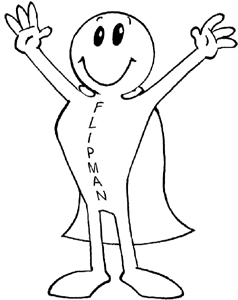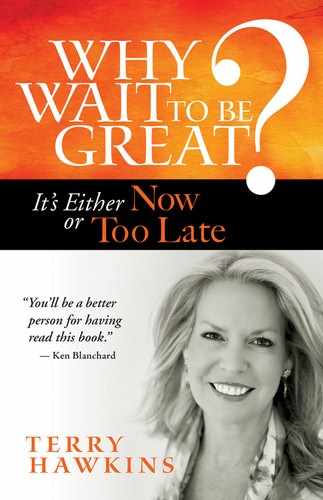Chapter 9
Perception
We now know enough to be able to recognize when we are using Pit behavior and language — or when someone else is. I’m also hoping that by now we recognize how debilitating it can be. Whether we’re a few inches deep or all the way down in the basement, knowing how to get out of the Pit is essential. Realizing we have the choice allows us to decide on the kind of life we want to live. It doesn’t matter how much money we have, how many possessions we have, what level of education we’ve reached, how many friends we enjoy, what job we hold, what has happened in our past, or what we look like!
No one can go back and make a brand-new start, my friend, but anyone can start from here and make a brand-new end.
— ATTRIBUTED TO MARCUS AURELIUS, CARL BRAND,
DAN ZADRA, AND OTHERS
In modern psychology it’s often said that a person’s past behavior is a strong indicator of his or her future behavior. There’s an important distinction to be made: the future is not written in stone. Just because we behaved a certain way in our past does not mean we have to be that way in the future.
Our past ways of thinking and behaving can certainly influence us, but we must become the guardians of our thoughts and behaviors — of how we judge others and ourselves. Our earlier discussions on being dissociated and associated can support us in perceiving everything as an opportunity to grow. Judgment kills growth and never allows for a greater expansion of our current knowledge.
Perception and the Pit
Remember that house with the four different-colored sides viewed by four different people? They all agreed it was a house, but each person saw it as a different-colored house. And reality is the same; depending on our view of it, our experience of it will be different from others’. How we perceive something — a situation, an event, or a person — will ultimately determine how we feel, and this feeling then affects how we project ourselves. It’s the same when two people experience the same event and have completely different perceptions of it. Why? Because there is no such thing as pure perception. Our perception of the world is influenced by many factors, such as our upbringing, values, culture, beliefs, education, temperament, experiences, and age.

Hmm … how can I get out of the Pit?
Many of us can also make the mistake of creating a global opinion of a local event. Take, for example, relationships. Some of us may have had a string of “bad” relationships, and instead of taking responsibility for our part in attracting and maintaining such a relationship (local), we make our experience global (for example, “All men/women are #&*%#!”). We then project this global perception onto all of our future relationships. It’s almost as if we go in expecting to get the same result as we did in our past relationships. If you had a relationship with a partner who cheated on you, and you’ve made this a global perception, you may perceive everyone as untrustworthy, waiting to take advantage of you and hurt you. You might then act with a mistrusting, cynical, and guarded attitude. Whether we share such an assumption with others or even just continually think about it, we strengthen it, and therein lies our self-fulfilling prophecy. What we think about, we attract and create!
On the other hand, if you perceive yourself as a confident, loving, and enthusiastic person, you will be more likely to project a confident, loving, and enthusiastic persona, and again, you will strengthen this thought process. Life is a mirror. If we see an ugly, negative world, how do we think the world responds? When we have the courage to not share our negative thoughts, we weaken them. That’s why gossip is so highly charged; the more we gossip, the more it’s fuelled.
It’s the same with every situation and event in our lives. Every day, we have a choice as to how to perceive what we experience.
I have a story from my childhood that typifies this beautifully for me. When I was about four or five years old, I had a big wart on my right knee, and to my young eyes, it looked huge!
It didn’t bother me that much until one day I fell down the stairs at home and it came off in the fall. There was blood everywhere, so my mother threw me a towel and told me to clean up the mess. She was a nurse, and my five siblings and I rarely got much sympathy for what she called “minor flesh wounds.” I can still fondly recall my mother saying, “You think that’s a wound? Come to the hospital, and I’ll show you a wound!” We certainly grew up as a resilient bunch!
Well, my small wound healed, and that was the end of it — or so I thought. Over the following years, warts started to appear and multiply all over my body. By the time I was ten years old, I had warts all over my legs and toes. I had plantar warts on the soles of my feet, and I had large, unsightly warts on my fingers and arms. In fact, the entire end of my right index finger was a wart, which prevented the nail from growing properly. They were everywhere; I even had them on my face.
It was so revolting for me, and I felt like the ugliest person alive. This wasn’t just a momentary feeling. It was a feeling that was with me practically all day, every day. I was continually counting my warts. The highest number I ever got to was 167, and they stayed around that number for many years. The warts persisted right through that totally self-conscious and insecure stage called puberty. When I was about twelve or thirteen, I was sitting beside a boy at school who also had a lot of warts on his feet. I remember thinking how disgusting they looked, and that’s when it dawned on me how disgusting I must look to other people. I felt like I was a living, breathing, walking, talking wart, and that was all I was — a wart. That feeling continued through those painful teenage years. I remember being about fifteen and feeling so sorry for myself. I couldn’t believe how unfair life was to me. I constantly wondered what I had done to deserve such a cruel fate. My mother tried every old folk remedy she could think of to get rid of them. We tried all sorts of crazy things, but nothing ever worked. I would go to the doctor and endure the pain of having them frozen off, but the results were always the same: nothing ever changed, and they just grew back with a vengeance. I was desperate to get rid of those warts, and my whole life revolved around how ugly I felt because of them.
Looking back, I had many profound learning opportunities because of my warts. One of those opportunities came about in my mid-teens when I had just started dating one of the cutest boys in town. Apart from the fact that I was in shock that he had asked me out, I was also convinced that once he saw my warts, he would not want to go out with me again. I resigned myself to just enjoying it while it lasted. One afternoon, we were sitting together at the park, and he began affectionately rubbing the outside of my lower right leg. This was where the majority of the warts had clustered. It was like slow motion. As he got closer to the “wart zone,” I froze. His hand reached the warts, and I felt like dying. But then a strange and wonderful thing happened. He paused for a microsecond, and I thought, Great, he just touched the freak’s warts. He’s going to scream and run away. But he didn’t. He continued his affectionate display, and I started to feel amazing. In that moment, I had my first glimpse of what it felt like to be completely accepted regardless of what I looked like. I will never forget him for showing me, for just a moment, that I was more than my warts.
About two years after that, my brother was involved in a serious motorbike accident and was placed on life support. I remember walking into the intensive care unit and seeing him with perfect skin. He had had mild acne when he was admitted, but now his face was as smooth as a baby’s bottom. It was only for a split second, but I remember thinking If I were on life support, then maybe my warts would go too!
It was a crazy thought, I know. But that’s when I got a flash of sudden awareness and understanding, something often referred to as satori. It’s that sensation we have all had: one moment we don’t know, and the very next, we do! I remember thinking, You idiot. Your brother’s fighting for his life, and you’re complaining about a few lumps and bumps on your body. It was a defining moment for me. At seventeen years old, I made a decision. I decided that I wasn’t my warts. I realized that I had two arms and two legs, I had an OK body, an OK personality, and I was reasonably attractive. I also knew that I could tell a good joke and make people laugh — something I loved doing. I accepted that I had a lot going for me, and I decided that rather than being consumed with my (perceived) ugliness, as I had been for many years, I was going to be grateful for what I had. I was not going to focus on those warts anymore. I started to own my life.
I don’t know exactly when it happened, but about six or seven months later, as I was climbing out of bed, I looked at my legs and noticed there were white dots where the warts had been. Every single wart was gone!
In that moment I felt a joy that I had never felt before. What a wonderful metaphor for life, for all of us who hang on to something that we think defines us. I had been blaming my warts for the fact that I didn’t feel that I was good enough. I blamed them for my not feeling attractive, for not being invited to parties, and so they had become the reason I couldn’t do this or that. Whatever it was, I blamed my warts.
We all have a “wart story,” don’t we? Something that we think defines us. Something that we think will stop other people from loving us, from accepting us “warts and all.”
But we are not our past. We are not the events that have happened to us. We are so much more than that! So rather than judge ourselves, let’s celebrate the beautiful tapestry that we have become because of all these colorful threads, not in spite of them.
To finish my wart story, many years later, when Jackson was about two and a half, he started to get small lumps on his neck. They looked like baby warts to me, and I was filled with dread. His little friend had them as well, and his mother would squeeze the core out to make them go away. I was filled with horror that my own son would be facing a tortured childhood like mine, so I suggested to him that we, too, do this “procedure.” He looked at me with absolute shock on his face, put his little chubby hands around his neck, and said loudly, “No, Mama! I lub my lumps!”
I laughed and hugged him tight. Jackson’s lumps disappeared by themselves a few weeks later. My wonderful toddler had taught me that self-love is one of the greatest gifts we can have. He taught me to “lub” all my bits!
Judgment Is Also a Perception
Another way in which perception works in our lives is through judgment. Self-judgment and judgment of others is a Pitman way of living. It amazes me how easily, how quickly and harshly we can judge others and ourselves. Many years ago, someone asked whether I felt judged by my audiences during my presentations. I had to laugh. “Judge me?” I said. “They start at my shoes and work their way up!”
“Does it worry you?” was the next question.
“No. It used to bother me, but now my self-esteem is a lot healthier. It was my insecurity that made me so sensitive to other people’s perception of me, but those feelings taught me a great deal. I realized that I am not my hair, and I am not my clothes. I am not my shoes, and I am not my age. I am not my skin, and I am not my gender. The outside of me is what I like to call my wrapping paper. The outside is just how life happened to wrap me up. Terry Hawkins is on the inside.”
We all have different wrapping paper. Even identical twins are wrapped with slightly different wrapping paper. One of the saddest things I’ve come to realize over the years is that if we don’t like a person’s wrapping paper, we don’t necessarily bother to find the gift inside. I came up with that analogy after watching a television commercial for people living with blindness. A couple was getting married. How sad, I thought. They’ll never have the opportunity to see each other. Then I got another satori! How wonderful that they were marrying for the right reasons — for who they were and not what they looked like! That’s when I had my epiphany about racism. If we were all born blind, it would be difficult for racism to exist. Racism is actually illogical — think about that for a moment. If we couldn’t see the color of someone’s skin, then we wouldn’t be able to judge them for that. I believe that when we judge another person, for whatever reason, we’re saying a lot more about ourselves than we are about them.
I find that I judge others when I’m feeling insecure. Pay attention the next time you make someone wrong simply because that person lives his or her life differently than you live yours. That’s what judgment is to me — making another person wrong simply because he or she has chosen a different path. Why are some of us so frightened to let others be different? Just as other people are not their wrapping paper, neither are you. There is so much more to all of us than what is on the outside. So don’t stay in the Pit just because you believe that someone gave you a good reason to be there. Remember, it’s all perception.
I know that sometimes in life it can feel as though we’re locked up in chains. For each of us, though, there comes a time when we need to find our key and unlock the things that inhibit us — unlock our old way of operating, and create a new, more empowered way of life. And this is where Flipman enters the building.

